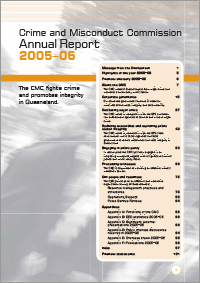The Crime and Misconduct Commission’s civil confiscation scheme has exceeded its target for 2005–06, restraining $11 million worth of assets acquired through suspected criminal activity, according to the CMC’s annual report tabled in state parliament today.
CMC Chairperson Robert Needham said that, since the Criminal Proceeds Confiscation Act 2002 came into operation, $36.6 million in assets have been restrained as a result of civil confiscation procedures.
‘The CMC continues to undermine the financial basis for crime through the civil confiscation scheme and in the past year finalised 25 matters leading to about $2 million being forfeited to the state,’ Mr Needham said.
‘As civil confiscation becomes an embedded weapon in the CMC’s fight against crime, the organisation’s workload in this area is increasing and we expect this rate of growth to continue for several years.’
The CMC’s annual report also highlights achievements in reducing misconduct and improving integrity in public sector agencies.
This year the CMC conducted public hearings into electoral corruption on the Gold Coast. A comprehensive report, Independence, influence and integrity in local government, disclosed that the electoral process had been corrupted.
‘The Commission made recommendations for prosecution proceedings against six people, and 19 recommendations for reform of the local government electoral process,’ Mr Needham said.
‘The CMC understands the frustrations at times felt by the general public towards exposing and dealing with wrongdoing, but we will continue to play our part by undertaking rigorous investigations that can withstand public scrutiny, conduct public hearings when necessary and report fearlessly on contentious matters.’
Mr Needham said a landmark development in the CMC’s complaints area during the year was the completion of a project that allows government departments and other key agencies to deal more quickly with less serious complaints of misconduct.
‘As a result, CEOs can now get started straightaway on dealing with certain matters, rather than having to wait for a directive from the CMC. This development reflects our commitment to encouraging CEOs to take greater responsibility for dealing with misconduct in their own areas.’
Mr Needham said the annual report showed the diversity of the CMC’s role which encompasses preventing crime and misconduct to offering protection to witnesses in criminal proceedings, to recovering the proceeds of crime.
The year’s highlights include:
Major crime
- 49 people charged with 316 offences
- 20 investigations finalised – 15 into criminal paedophilia, 3 into organised crime and 2 into serious crime
- 104 days of investigative hearings held, with 92 witnesses giving evidence
- 8 joint investigations with the QPS and other law enforcement agencies (4 finalised)
- Paedophilia operations resulted in 16 people being charged with 85 offences
Reducing misconduct and improving integrity
- 3924 complaints received
- 2879 matters referred to public sector agencies to deal with
- 158 reviews conducted of matters dealt with by agencies (vast majority satisfactorily handled)
- 136 complaints referred for CMC investigation
- Regional educational visits to Cairns, Karumba, Inglewood and the Sunshine Coast
Public policy
- Implementation of recommendations reviewed for Seeking justice report (arising from Inquiry into Handling Sexual Offence Matters by Criminal Justice System)
- Review of progress in implementation of reforms to child protection system
- Survey and comparison of adult entertainment regulation in all states and territories
- Consultation and public hearings about the possible extension of outcall prostitution services (report published
- Review of trial police powers relating to volatile substance misuse and evaluation of government’s ‘places of safety model
- Start on review of public nuisance provisions and motorbike noise legislative provisions
Witness protection
- 136 people protected in 70 operations
- 38 people protected at court
- 61 threat assessments conducted.
ENDS


